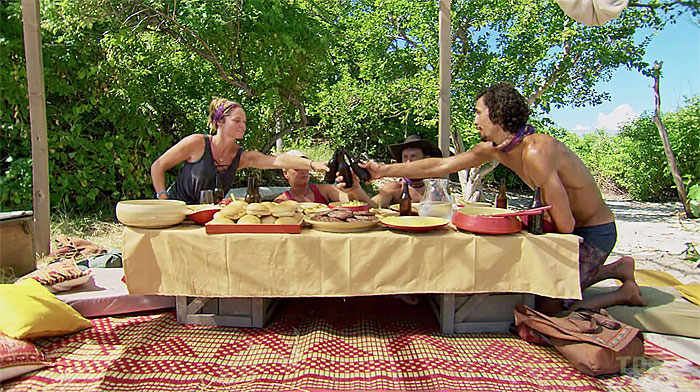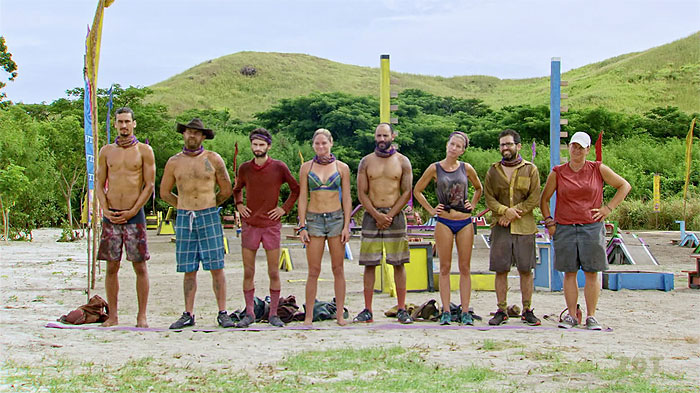

While they might not have explicitly discussed it, even early Survivor players thought about their stories. Now, though, a story can get you the boot really quickly.
What do I mean? Well, think about Ben and his alliance right now: They all want him out because they think his story will play to the jury. Ryan’s mentioned it a few times too. Nobody wants to sit next to a former Marine with young kids.
Heck, in Nicaragua, we saw castaways openly talk about booting Kelly Bruno because they didn’t want to compete against someone with a physical disability. This is basically something that happens every single season now.
The more savvy players, though, they think about their story throughout the game. They know that, in the end, they will need to tell a clear, cohesive narrative that sums up why they should win. The problem is that old adage that says everyone is the hero of their own story. In Survivor, to me, that means castaways sometimes get too blinded by what’s good for their own game that they can’t put themselves in their competitors’ shoes. And, we know, the best way to win Survivor is to be one step ahead of everyone else, to anticipate what others will do before they do it.
A couple years ago, writing in this space, I talked about a theory in social psychology called narrative transportation theory. As we know, a theory is just a way of explaining what happens. Sometimes in this here column, the theories we talk about are super simple; they just make sense. And other times, it gets a little complicated. This one, well, it confuses me a bit. But at its core, narrative transportation theory, which is often used in advertising or other kinds of persuasion research, really makes sense for what we saw this week.
The main idea behind narrative transportation theory is that stories, or narrative, are incredibility important to us as humans. You know the old cliché, the one that says humans are real storytelling animals. We say this because, throughout time, that’s how we’ve learned, through telling stories. That’s basically what the theory argues, that In essence: When certain conditions are set, people get lost in stories, and when they get lost, their attitudes and beliefs shift to fit that story.

I think that Ryan and Chrissy in particular and, to a lesser extent JP (so long Winner Pick™!), got lost in the story of the alliance of seven. Basically, Ryan and Chrissy convinced themselves that it made sense to keep the alliance together and they’d grab Ben and JP (or Devon) and pick off the rest. They convinced themselves that this story, this narrative, made sense to everyone. But, of course, it didn’t. Folks like Lauren knew that they had to get Chrissy and Ryan before they got them. So they made a Big Move™.
This is key. You would think seasoned Survivor players such as Ryan and Chrissy would know they needed to strike first, but they built up, in their minds, this idea of the seven actually staying together. I would argue, also, that this strategy would have worked for them since Mike and Joe are, at least in the minds of Ryan and Chrissy, more strategic players than Lauren, Devon, JP and Ashley (at least).
Does this make sense? I believe we say Ryan and Chrissy have their attitudes and beliefs changes because they bought into this story of the seven. Bad, bad, move. We’ll see if it’s the end of them …
So now that we’re done with the theory, let’s take a look at the final seven:
Solewa

- Mike – Of all the people left in the game, Mike is in the weirdest position. Why him? Because I don’t believe he’ll be a target right away; I actually think he’s going to be a hot commodity in terms of using his vote. But, even though he could potentially go through the rest of the game just flipping over and over, I think he’s safe this week, but not for long. Yet, even though that’s my opinion, he could go either way, really. If you told me Mike left this week or won the game, I’d be surprised, but not really shocked.
- Chrissy – As I mentioned in the early part of this column, I have literally no idea why Chrissy is still in this game. While the alliance of four made a nice move to take control of the game, seemingly, eliminating JP seems incredibly stupid to me. But what do I know? Anyway, given a second life, I have a feeling Chrissy and Ryan have one more trick up their sleeves. While their edit was really bad this week, we know one new idol will be in play, Mike must feel burnt and then it only takes one more vote…
- Ben – From the outside, Ben looks to be in a great position. He’s in a strong alliance and owns an idol that nobody knows about. But us viewers know Ashley and Lauren have already talked about ditching Ben. And we all saw the previews for next week’s episode. If the preview is to be believed, Ben might want to turn on his alliance and Ryan, Chrissy and possibly Mike might be waiting for him with open arms.
- Ashley – I feel like I called Ashley going far in this game pretty early on, but the more I watch her, the more I don’t think she’s got much of a chance. While she claims to be making moves now, we know she’s still just helping enact other people’s plans. In reality, what twosome could she sit at final tribal with and make a good case to win? I don’t see it. For as mediocre (or worse) as this season feels, we should be happy that Ashley is pretty much the player who’s done the least so far. That’s a good final seven … not even one real goat.
- Ryan – Well, my prediction last week focused on Devon blindsiding Ryan. We saw that, sort of, but not really. I know that I’ve explained how Chrissy and Ryan could still make a move this week, but I think this is the week Ryan goes home. I don’t know. You would think the alliance of four, if they stay together, would go with Chrissy, if possible, but I just have a feeling it’s Ryan.
- Devon – You know, I spent hours crying when JP got the boot. He’s on my fantasy team and was my Winner Pick™. But, you know who else is on my fantasy team? That’s right, Devon. And Mike. Now I don’t think Mike is lasting till the end, or winning, but if anyone is receiving the Winner’s Edit™, it’s definitely Devon. And let’s give this dude some credit: I don’t think anyone predicted this and this guy is playing his ass off. He’s been amazing basically the whole game. The way he played under the radar at first, cultivating relationships, and now he’s making huge moves. How can you not be rooting for the guy?
- Lauren – I have to say, I pegged Lauren completely incorrectly. I thought she was going to be the person who focused on a couple players too much, the person who never made a move and could be dragged to the end as a goat. Boy, was I wrong. The way she played last episode was kind of amazing. I think Lauren’s making the end. And she might win. But she probably loses to Devon. That’s going to be the question, I think: How well will Devon or Lauren position themselves for final tribal?
OK, only three episodes left and this season is finally starting to get good. I’m excited. Let’s talk next week.
 Pat Ferrucci started watching Survivor when Episode Two of Borneo first aired. He's seen every episode since. Besides recapping here, he'll be live-tweeting this season from the Mountain Time Zone. Why? Because nobody cares about the Mountain Time Zone except when they want to ski. Follow him @patferrucci for Survivor stuff and tweets about anything and everything that enters his feeble mind.
Pat Ferrucci started watching Survivor when Episode Two of Borneo first aired. He's seen every episode since. Besides recapping here, he'll be live-tweeting this season from the Mountain Time Zone. Why? Because nobody cares about the Mountain Time Zone except when they want to ski. Follow him @patferrucci for Survivor stuff and tweets about anything and everything that enters his feeble mind.
- S35 Well, in theory... index
- Pre-season: TDT Survivor: HHH contestant draft
- Cast: Who am I going to curse this season?
- Ep.1: Let's talk some in-group and some out-group
- Ep.2: You're a hustler. A hustler. You are. Yes you.
- Ep.3: His name was Patrick. Now it's Matthew
- Ep.4: It's all about cohesion, the cohesion of the group
- Ep.5: The ego and its utility, a tale of contradictory ethics
- Ep.6: Who holds the power at the merge?
- Ep.7: Who holds the golden fleece after the merge?
- Ep.9: Ben needs a lesson in mass communication theory... badly
- Eps.10-11: Chrissy and Ryan get lost in their own story
- Ep.12: Let's have a chat about hypocrisy
- Ep.13: Where does it all stand?
- Pre-Ep.14: Jury jeopardy - HvHvH